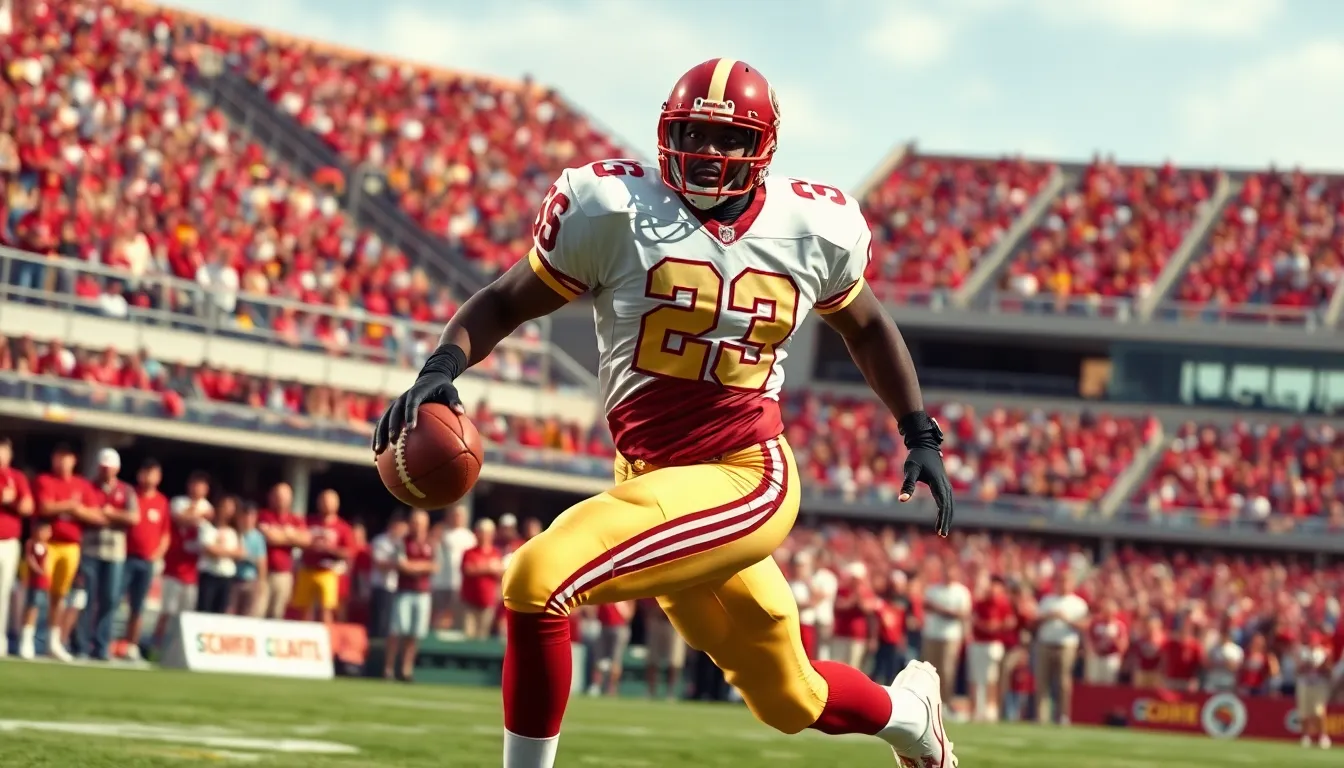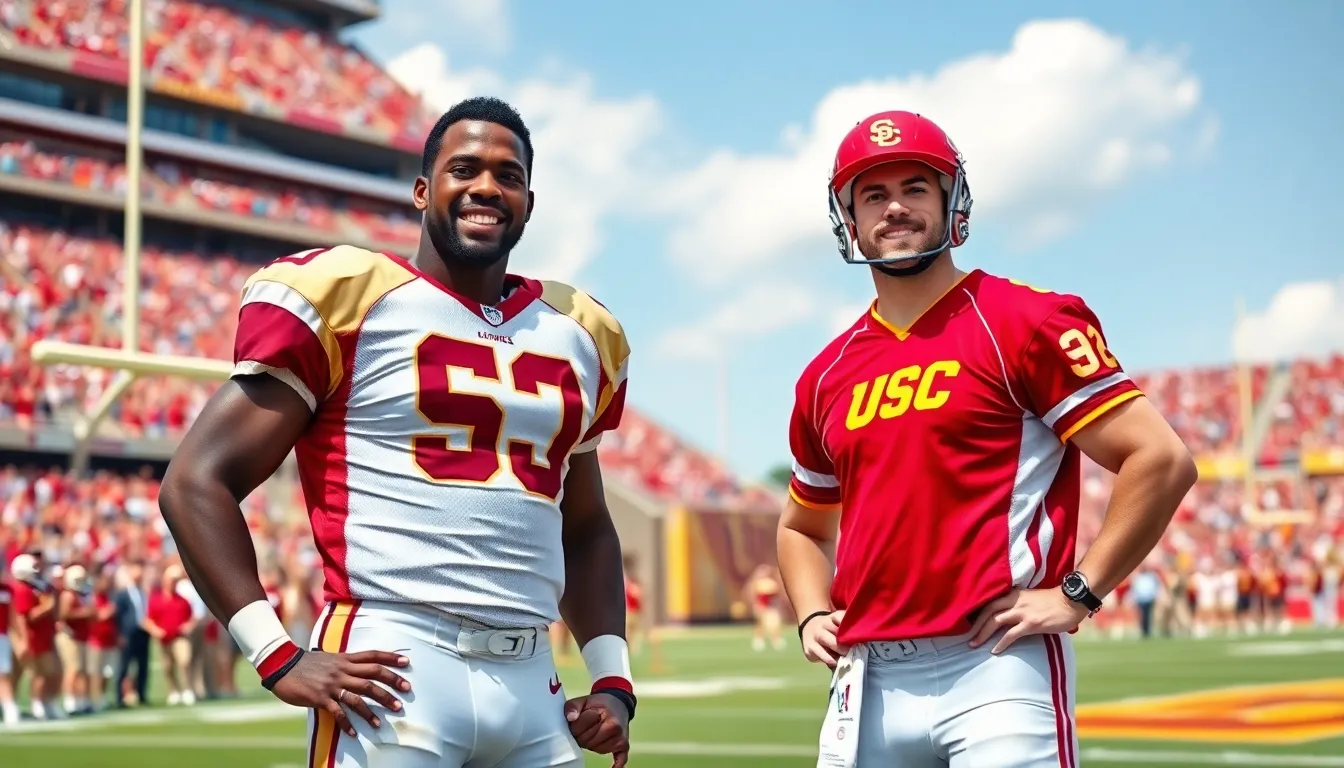Table of Contents
ToggleWhen it comes to college football legends, few names spark as much excitement as Deion Sanders and Matt Leinart. These two icons turned the gridiron into their personal playgrounds, dazzling fans with their athletic prowess and flair. Imagine a world where Sanders’ electrifying speed meets Leinart’s pinpoint accuracy—it’s a matchup that could give any football fan goosebumps.
As they navigated their college careers, both players redefined what it means to be a star. Sanders brought swagger and style, while Leinart showcased a cool confidence that made him a household name. Dive into the thrilling saga of their journeys, and discover how their paths intertwined in the ever-evolving landscape of college football. Whether you’re a die-hard fan or just curious about the game, this exploration of their legacies promises to entertain and enlighten.
Overview of Deion Sanders and Matt Leinart
Deion Sanders stands out as one of the most electrifying athletes in college football history. Known for his unmatched speed and agility, he transformed the cornerback position during his time at Florida State University. Sanders earned consensus All-American honors, making significant contributions to the Seminoles’ national championship run in 1993.
Matt Leinart also carved out a remarkable legacy at the collegiate level. Playing as a quarterback for the University of Southern California, he showcased precision and leadership that helped elevate the Trojans to two national championships in 2003 and 2004. Leinart received the prestigious Heisman Trophy in 2004, solidifying his status as one of the game’s all-time greats.
Both players left indelible marks within the college football landscape. Sanders’ charismatic personality and playmaking ability captivated audiences, while Leinart’s skillful passing and strategic mind won games and accolades. Their distinctive styles contributed to fan engagement and drawn crowds, creating memorable moments in college stadiums.
When comparing their careers, Sanders and Leinart represent differing but complementary aspects of college football excellence. Sanders embodies raw athleticism and flair, while Leinart reflects strategic prowess and precision. Together, their stories highlight the rich history of college football and the excitement it generates among fans and players alike.
Deion Sanders’ College Football Career

Deion Sanders made a significant impact during his college football tenure at Florida State University. Renowned for his exceptional speed and agility, he transformed the cornerback position.
Achievements and Awards
Sanders’ college career brought numerous accolades. He earned consensus All-American honors in 1987 and 1988. His pivotal role in the Seminoles’ 1993 national championship run showed his skill in high-stakes scenarios. He also received the Jim Thorpe Award as the nation’s best defensive back, solidifying his legacy in college football. His ability to intercept passes and return them for touchdowns set records, showcasing his playmaking ability on the field.
Impact on the Game
Sanders’ style of play reshaped the cornerback position. He brought an electrifying energy that captivated fans and teammates alike. His unique ability to shift the momentum of games transformed how teams approached passing offenses. The swagger he displayed influenced a generation of cornerbacks, encouraging them to embrace confidence and skill. College football saw a shift toward valuing speed and athleticism at the defensive back position, thanks to his groundbreaking influence.
Matt Leinart’s College Football Journey
Matt Leinart’s college football career at the University of Southern California stands out for its impressive achievements. Known for his strong leadership, he guided the Trojans to significant victories, solidifying his place in college football history.
Key Statistics and Milestones
Leinart recorded remarkable statistics during his college tenure. Over three seasons, he threw for 10,693 yards and completed 66.8% of his passes. This accuracy resulted in 99 touchdown passes, emphasizing his effectiveness as a passer. In 2004 alone, he amassed 3,815 yards, which contributed to his team’s 13-0 record. Those who followed his journey witnessed not just numbers, but the way he elevated his teammates’ performances. Leinart’s contributions led USC to consecutive national championships, earmarking his legacy in college football.
Heisman Trophy Win
In 2004, Leinart earned the prestigious Heisman Trophy, an honor reserved for the nation’s top player. His performance that season captured the attention of fans and analysts alike, showcasing his skill and poise on the field. Voters recognized him for his leadership, pivotal in maintaining USC’s undefeated record. Celebrated for his strategic play and ability to read defenses, he stood out among his peers. Achieving this accolade further cemented his status, illustrating his impact in college football history.
Comparing Their Styles and Legacies
Both Deion Sanders and Matt Leinart left significant marks on college football, showcasing their unique styles and leadership abilities. Their legacies resonate through the sport, influencing generations of players.
Leadership Qualities
Leinart’s leadership stood out during crucial games, guiding his teammates with poise and confidence. He had a knack for maintaining composure under pressure, which often translated into game-winning performances. His ability to rally the Trojans highlights the importance of strong leadership in achieving team success. In contrast, Sanders provided an electrifying presence both on and off the field. His charisma and confidence inspired teammates and fans alike, while his competitive spirit fostered camaraderie. With dedication evident in their respective programs, both players exemplified how leadership can elevate a team’s performance.
Influence on Future Players
Sanders’ flashy style and impact on defensive play transformed how future cornerbacks approached their game. Players now adopt a more athletic, dynamic approach to defense, taking cues from Sanders’ exceptional skills. His influence permeates through college football programs, inspiring athletes to emulate his techniques and confidence. Leinart’s legacy shaped the expectations of future quarterbacks, pushing them to marry accuracy with strategic decision-making. By setting a standard for performance in high-pressure situations, he motivated aspiring quarterbacks to hone their skills and elevate their games. Together, they established benchmarks for excellence, driving competitive spirit in collegiate football.
Deion Sanders and Matt Leinart represent two of the most influential figures in college football history. Their unique talents and leadership styles not only defined their respective positions but also inspired countless athletes who followed in their footsteps. Sanders’ electrifying play and charisma redefined the cornerback role while Leinart’s precision and strategic mindset set a new standard for quarterbacks.
Both athletes left an indelible mark on the sport, shaping the future of college football. Their legacies continue to resonate as they embody the spirit of competition and excellence that drives players to reach new heights. As fans and aspiring athletes look back on their remarkable journeys, the impact of Sanders and Leinart remains a vital part of college football’s narrative.





